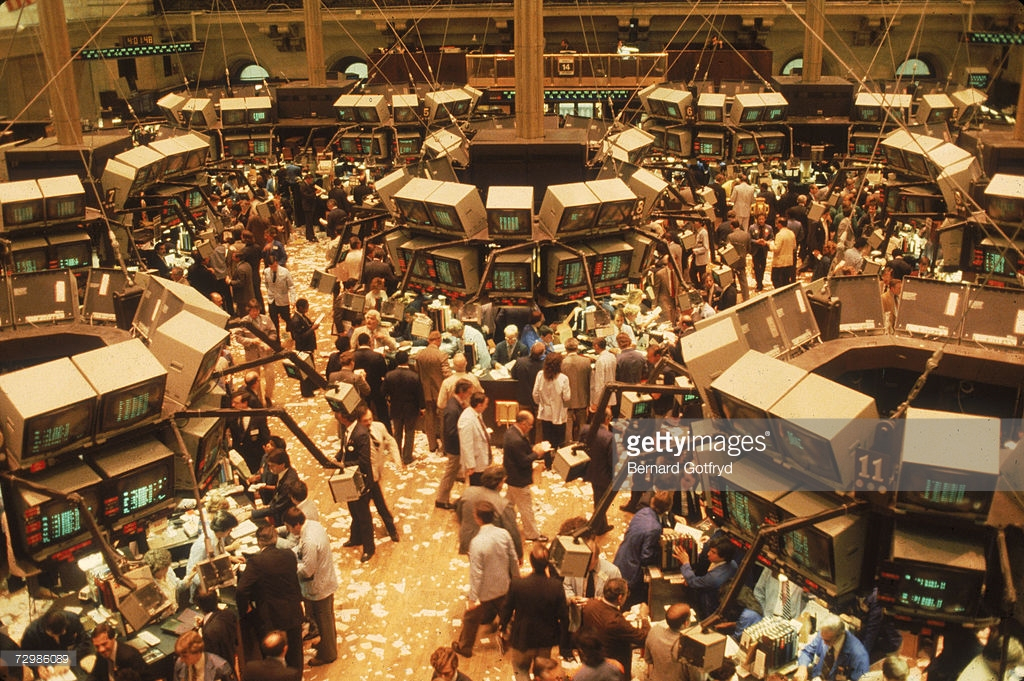Once upon a time, a business owner seeking means to finance his company would share the ownership of his company with investors - people who would inject capital into the company so it could grow and attain its business objectives.
The shareholders would obtain partial ownership of the company and in return on their investment would benefit from the profits made by the company.
The basic principles of such an arrangement are easy to understand and fair; with risk, the assessment of risk, and the taking of risk, being its key attribute. The assessment of risk on the part of the parties involved could result in either profit paid out in dividend or loss and potential liability. Thus a financial product had been created.
A popular product indeed. A product in such demand that markets were established, where supply and demand could meet. Business owners or their representatives could meet and discuss the terms of a share transaction with investors. The parties involved could bargain for a better deal.
As the number of transactions grew so did the complexity of the market.
Investors would not just keep a share of one particular company, they would distribute their money and the risk involved over various companies, whilst keeping stock of their shares. The markets would flourish as long as the money was available and shares were priced in accordance with the actual value of the companies involved.
The added complexity of markets requires not only specialized skills but also fine-tuned morals from the people involved.
With time companies evolved into corporations and investors into investment banks. New methods and products were created in order to obtain the best deal money could buy.
As corporations started to operate abroad and became multinationals, so did the markets open up to foreign investors and global financial institutions. Stock markets as they now were called were fulfilling a vital role in what had become a global economy. Everybody could participate, even private persons represented by their stockbrokers.
With the advent of computers, computerized trade was being introduced. The market was no longer the domain of real people, but of computers trading with other computers. And with the introduction of the internet, geographical locations were no longer a requirement.
The increase in computing power and data transmission speed via optical cabling meant that transactions could be conducted at almost the speed of light.
And then something snapped…
I am basically there to make money. I cannot and do not look at the social consequences of what I do. - George Soros (philanthropist), CBS 60 minutes, 1998.
The ever-increasing volume, complexity, speed, and volatility of the markets surpassed the mental and intellectual ability of the people involved. What once had begun as a means of meeting supply with demand - under the assessment of the risk involved - in dealing with real people, real companies, in a real economy, has degraded into a Las Vegas casino where both the gamblers and the dealers are computers - no humans allowed.
Somewhere, at some moment in time, bright minds had decided that computers are better at risk assessment than humans. Humans no longer fulfilling the role of the auctioneers of the trade but as monitors of the trade behind computer screens.
Real companies were being reduced to financial ratios; input parameters for financial algorithms that can only be understood by a happy few whizz kids; shares bundled into stocks represented by meaningless indices.
Business owners and founders were being replaced by CEOs talking incessantly about ‘shareholder value'.
But who is holding the shares and for how long, when shares are being traded by computers at breakneck speeds - in order to obtain profit margins that go well into the third decimal (.001)? And what value is being added to an individual company, the people involved, and to society at large?
The stock markets of old - egalitarian by nature to anybody with a surplus of money, interest in the economy, and a taste for risk-taking - have become elitist institutions shrouded in clouds of mystified information and misinformation...
Where are our governments when we need them?
Despite regulatory oversight, the stock markets cycle into crashes roughly every 7 years. Some of them impacting the global economies and human society as much as natural disasters like earthquakes or tsunamis do; others hidden in obscurity only noticed by those who are in the know. But these crashes are no natural phenomena, they are man-made as much as the investment bubbles that precede them.
Where the financial markets used to be limited to business, industry, and trade, they have securitized their fangs in the lives of ordinary people, in the fields of mortgaging, insurance, bank credit, and pension funds.
Where are our political leaders to put a halt to the insanity?
Once traditional practices of risk-taking and risk assessment have subverted into gambling, devoid of morality and empathy for the social consequences, something is deadly wrong in our societies.
Stock and securitization markets have been intertwined with our real economies, banking systems and are summing up ever-increasing percentages of our GDPs, the total economic output of the societies we live in. They have become systemic.
The crash of 07/08 cost the US taxpayer alone a staggering $800 billion in bail-outs adding to the national debt which now is nearing 20 trillion dollars ($20,000,000,000,000) and counting.
The 2012–2013 Cypriot financial crisis required a €10 billion international bailout. Part of the bail-out deal was that no insured deposit of €100,000 or less would be affected, cutting wealthy citizens, many from other countries like Russia, who were using Cyprus as a tax haven, out of the deal. So much for insurance...
And yet not one banker or trader was convicted for criminal neglect or financial malpractice, privatizing the profits whilst socializing the losses.
Our current leaders are oblivious to the risks we and our future generations are facing. It is their assessment to look the other way. While it lasts…
We have to get out of the bubble-bail-out cycle one way or the other.
Many economists deem a ratio of government debt against a nation’s GDP of 1:2 (50%) acceptable. The US currently has a ratio of 104% (!) and most of the EU countries run well into the 80% debt levels. For once Africa does well in the stats with most countries having ratios well below 50%. But beware of forces trying to collateralize their debt...
The stock markets and the financial services industry as a whole should be hedged. They should be legislated back unto the road they came from, brought back to sustainable volumes and business practices in order to become once again part of the real economy.
The sharks should be placed back in their tank...

